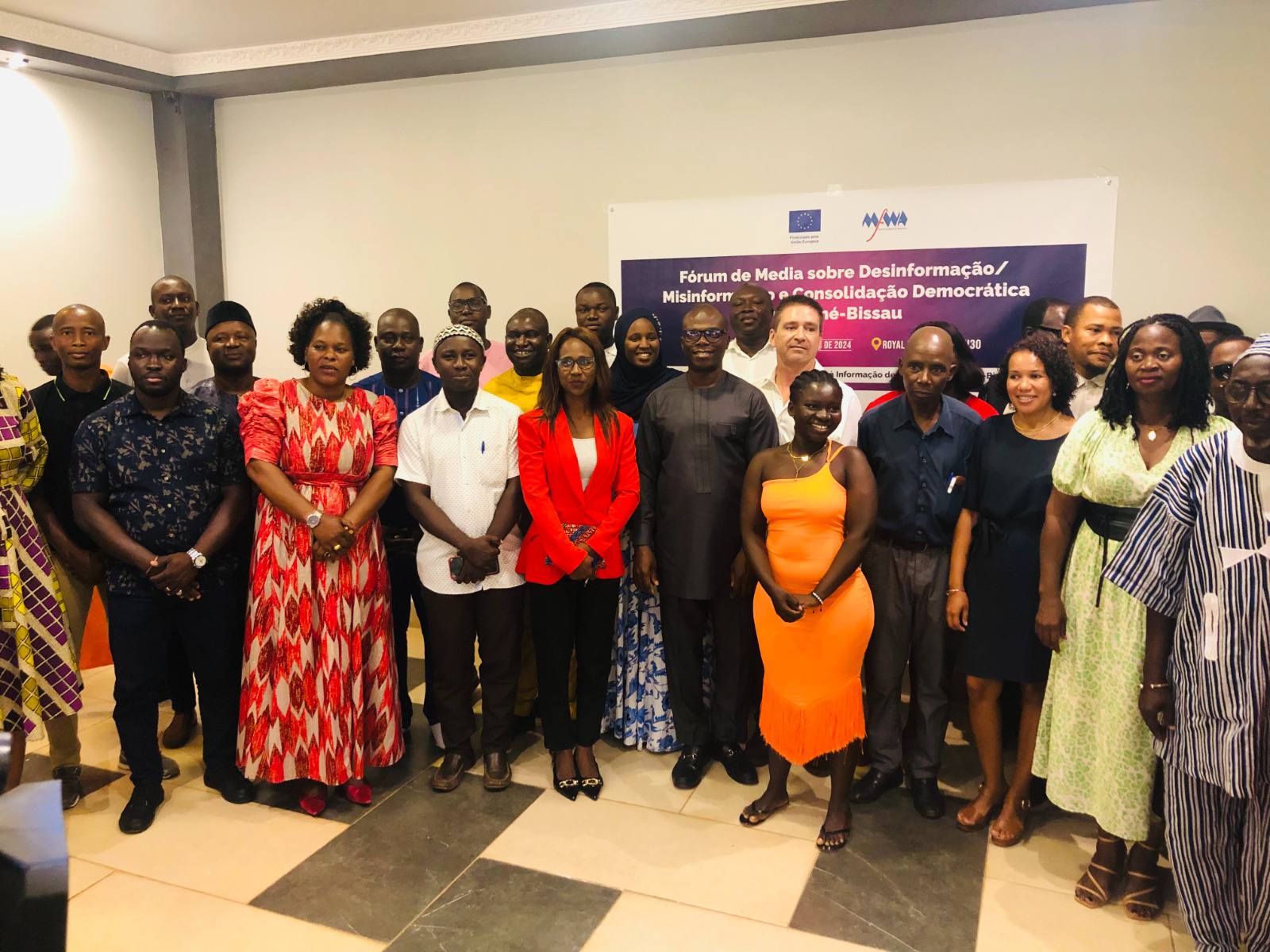Media stakeholders in Guinea-Bissau have called for reforms in the country’s laws in order to create a free space for press freedom and independence in the country. At a public forum jointly organised by the Media Foundation for West Africa MFWA (MFWA) and four local media actors in Bissau – SINJOTECS, AMPROCS, RENARC and OJGB – stakeholders identified a shrunk civic and media space as one of the key challenges of the media in the country.
The constricted civic space, in turn, is mainly caused by draconian press laws and legislation deficiencies that limit media practitioners’ access to information. Consequently, the stakeholders called for legal reforms in respect of the country’s press laws.
The forum, which was held on the theme “Media, Mis/Disinformation and Democratic Consolidation in Guinea Bissau,” also served as the closing ceremony for a three-year media development project that MFWA implemented, with support funding from the European Union (EU), in the country from 2021-2024.
The forum served as a platform for experts to deliver addresses and expert opinions on the issue, which was later explored further in a panel discussion.
Legal framework
Like all countries in the West African subregion, Guinea-Bissau is governed by a constitution which guarantees press freedom, and the independence of the media. However, in practice, this is not the case. There is a press law which recognizes the status of journalists in the country, however, the law does not guarantee the public’s access to information.
This fact, coupled with the reality that Guinea-Bissau is one of the politically unstable countries in Africa, means that journalists cannot truly hold government and duty-bearers to account.
Calls
Participants called for a modernization of the country’s media laws, noting that they have become archaic. Specifically, calls were made for the country’s Press Law to be infused with access to information provisions. Also, it was recommended that the existing laws should be reviewed to bring them in alignment with international media and human rights standards to protect journalists from arbitrary arrests and legal harassment. The government was also called upon to institute accountability mechanisms that enable the media to hold duty-bearers to account without fear of victimization.
Stakeholders also called for the development of a mechanism to guide security agencies in their investigation and redress of abuses against journalists. Further, there was a call for legal review of the law that establishes the National Media Council (CNCS) to make the Council more effective in regulating media outlets, particularly in the issuance of licenses, oversight, and the application of sanctions. There was also a call for specific regulation for social media platforms and the decriminalisation of hate speech.
Media law undergoing review
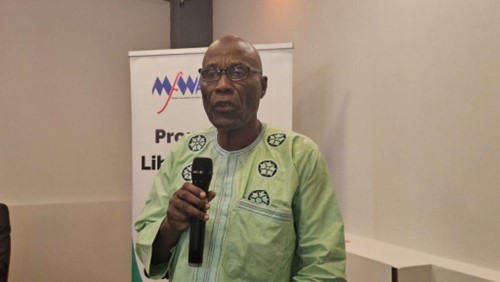
Among the stakeholders who spoke at the forum was Mr. Humberto Monteiro, Senior Advisor to the Minister of Social Communication, who delivered the keynote address at the forum. According to him, the government is updating the country’s laws, including its media laws, and will incorporate ideas from the forum into the review process.
“We understand that in the end, there will be recommendations for the Ministry of Social Communication, which is the body responsible for managing government policies in the area of social communication. We hope that these recommendations will serve to improve the package of laws that the government has on its agenda to update”.
There is a media law package that was approved in 2011 for updating. Regulations are also being prepared that will allow some order in the online media. There is much work to be done. The contribution of all is necessary, the involvement of professional organisations is necessary, and we hope that the journalistic class can unite with a single voice to propose their inputs to government which will be taken into account,” he said.
United efforts needed to fight threat against press freedom
In a welcome address, Ms. Indira Correia Baldé, President of SINJOTECS, MFWA’s Guinea-Bissau country partner, warned that press freedom and free expression are under threat in the country and that concerted efforts are needed to counter these threats.
“This moment is one of reflection and joy, but also of great responsibility. Press freedom and freedom of expression are under threat, but I believe that by fighting in unity, we shall prevail,” Ms. Baldé said.
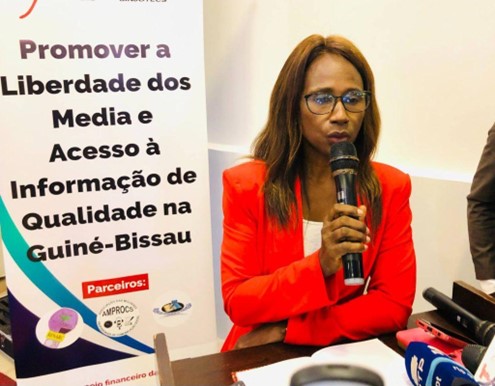
She also called for professionalism among media practitioners in Guinea-Bissau, saying: “We must be increasingly professional. Without professionalism, we are not serving the people of Guinea-Bissau.”
Adding to the call for a unity of purpose, the Interim President of the National Communications Council (CNCS), Domingos Meta Camara, said other threats that must be combated are mis/disinformation and hate speech. “The challenges of mis/disinformation and hate speech require collaborative solutions, particularly in a country with a history of political crisis.”
He warned that mis/disinformation and hate speech have serious negative implications for politics and governance in Guinea-Bissau urging for adherence to the media legal framework to protect journalists’ rights.
This same point was emphasized by Mr Carlos Abaitua Zarza, Attaché for Co-operation, Justice, Security, Gender and Human Rights, European Union Delegation to the Republic of Guinea-Bissau, who fervently warned against hate speech. “Hate speech and intolerance represent a threat to a social and pluralistic democracy,” he said.
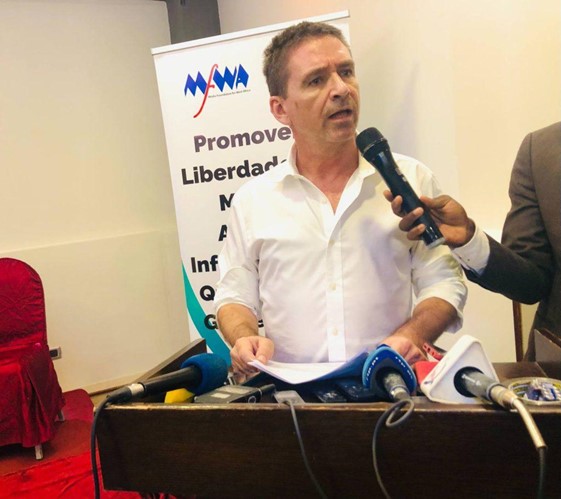
Mr. Abaitua Zarza emphasised responsible journalism is key to quality democracy. He highlighted the need for ethical and responsible journalism, which upholds human dignity and avoids promoting hate speech, stating, “The responsible practice of journalism aligns with the defence of democracy and human rights.”
He reaffirmed the EU’s commitment to continuing its collaboration with Guinea-Bissau to combat intolerance and reinforce democratic principles, emphasizing that freedom of expression and press freedom are crucial pillars of any democratic society. “Guinea-Bissau can count on the EU to continue assisting in building a free and democratic society, and together we will move towards the future.”
A key highlight of the forum was the presentation of laptops and digital recorders to Radio Capital FM as a token of solidarity from the MFWA and the EU in Guinea-Bissau.
Radio Capital FM has faced two devastating attacks and was a victim of the new regulatory fees that forced its closure for a year, hindering the community’s access to quality information.
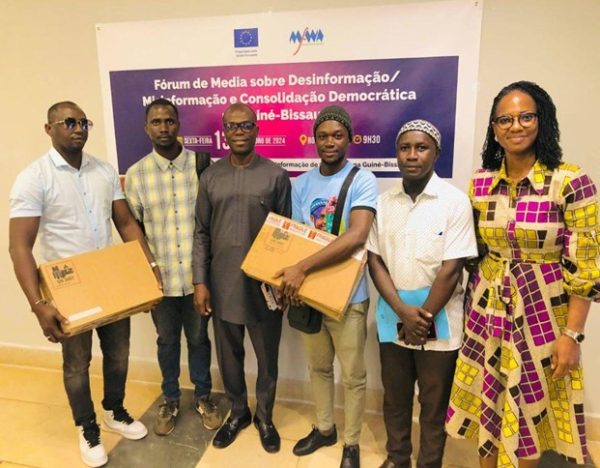
Through the “Media, Mis/Disinformation and Democratic Consolidation in Guinea-Bissau” project, over 130 media professionals and state actors gained essential skills in human rights, press freedom, and digital rights, while 50 leaders from key media organisations learned to better track and document violations against journalists and free expression. The project helped these organisations grow stronger by supporting them in creating strategic plans for their future. Journalists were also equipped to produce accurate, ethical content, playing a vital role in countering extremism. A major milestone was the launch of a National Comprehensive Framework on the Safety of Journalists, alongside a shared website to highlight press freedom issues and media sector updates, bringing greater transparency and collaboration between the media and the state.



